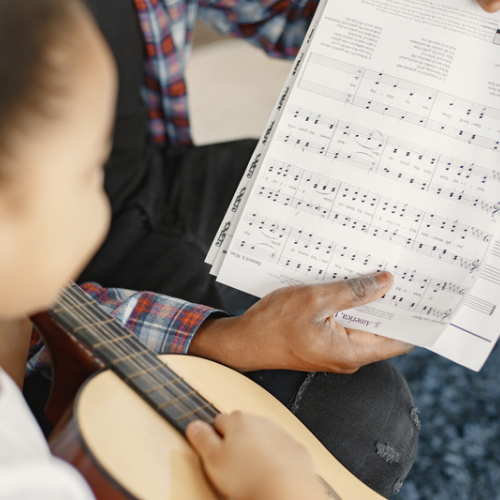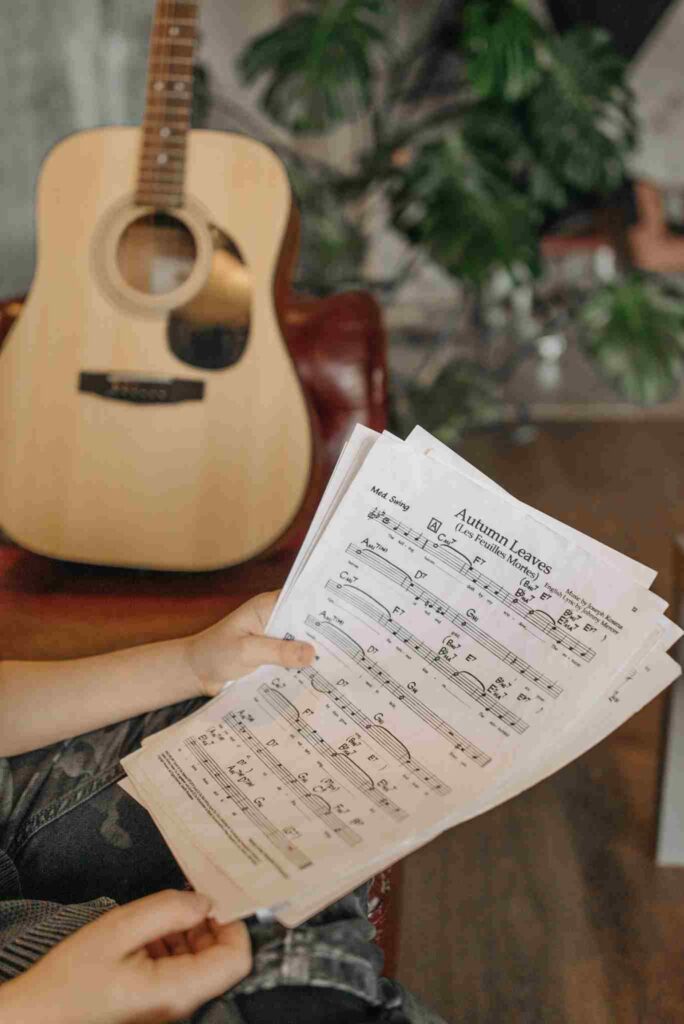Are you new to the guitar or thinking about whether to try playing? Almost everyone at the start wonders how long it takes to learn guitar. There’s no harm in admitting we want to get good at something as quickly as possible.
Unfortunately it’s never that easy. So, how long does it really take to learn the guitar? Well, how long is a piece of string? Sadly there is no set answer. It depends on so many factors including how often you practice, how well you practice, are you self taught or taking lessons, do you have previous musical experience and more.

It’s better to accept it will take as long as it does and just begin learning. The longer you wait to start the longer it’ll take to learn!
But if you want to have a better understanding of how long it’s likely to take, what you can do to speed up the process and what not to do then keep reading. I’ll talk through my own experiences with learning and how long it took me along with some other examples to give you an idea of the average time it takes.
How Long Does it Take to Learn Guitar?
Honest answer: It could take you any amount of time. It all comes down to how many hours you put in practising!
If you practise consistently, investing time to play frequently, then that accumulation of hours will add up. It’s actually pretty obvious when you think about it:
One person practises a couple of days a week for 20 minutes. Another practise for an hour every day without fail. Who’s going to be better or have made more progress after 6 months?
I think we both know the answer.
In fairness there are other factors involved. Practising for an hour every day is all well and good if what you’re practising is actually useful.
But if that practise amounts to a hour of mindless noodling then it’s going to be pretty useless. Progress will be slow at best.
So the other factors involved are important too. Those include the following:
What Are You Practising
There’s no point practising things you already know. You need to focus on areas that you struggle and specifically work on them.
If you fall back into the comfort zone of things you’ve already got down all you’re going to do is stay at that level. You’ll hit the dreaded plateau!
One of the best ways to avoid this is by taking a good look at where your weaknesses are. Are your chord transitions not up to scratch? Is your alternate picking inconsistent? Do you need to learn more scales? Are you missing notes when bending?
Whatever areas you feel need the most work should be where you spend time practising. Then you can devise a plan – be it 30 minutes, an hour etc – and break it up into something like 10 minute chunks that are designed to work on those weak points.
Having a proper practise plan gives you specific exercises to do every single day and if you stick to them you will see big improvements quickly. Far quicker than just picking up your guitar and hoping what you play will somehow make you better.

How Are You Practising
Imagine this: you sit down with your guitar, play a few songs you learnt months ago, noodle around a bit more then put it away. You played for 45 minutes in total.
What about if you spend 3 hours every Saturday playing but not at all the rest of the week.
Have they been good practice sessions? How much will you have improved or learnt in those two scenarios?
The answer is: very little! It’ll have been almost useless.
You can’t expect to get better unless you practise well. And that means practising regularly and practising the right things.
There’s also time to consider. Some people can play for hours at a time and find that works for them.
But for most of us doing shorter bursts is going to be much more beneficial. 30 minutes every day will get better results than one off big sessions of multiple hours.
What Are Your Goals
What you want to achieve in terms of playing the guitar is going to have a big impact on how long it takes as well.
For example if your goal is to learn a few chords so you can strum around a campfire or accompany yourself singing that’s very attainable in a fairly short period of time. If you want to become a professional session guitarist who is extremely capable in a variety of different styles that could take decades.
Chances are you’ll be somewhere in between those two examples. But it demonstrates that the greater your goals and the more ambitious they are the longer it will take.
It also means reaching those goals will require greater dedication and commitment than the more casual player.
Self Taught vs A Teacher
It’s never been easier to teach yourself the guitar than it is now. With the internet and YouTube as well as online courses you have a huge amount of resources at your fingertips.
But, and this is purely my gut feeling rather than a fact, I still think getting a teacher will see you progress faster and avoid bad habits that need fixing later on.
Having someone who can pick up on things you’re not quite getting right, notice your weaknesses or where you need to focus, even having someone to ask questions and bounce ideas off of.
That’s something only a teacher can provide. And something that I feel will help you to learn faster.
I’ve covered this in further detail looking at the pros and cons of guitar lessons.

So, How Many Months or Years Does it Take?
Ok, if you want an actual figure of days, months or years then look at it like this:
If you’re a beginner you can learn the guitar on a very basic level – strumming some chords, playing basic songs – within months if you practice consistently and properly. 3-6 months is a very achievable time frame.
Getting to an intermediate level – comfortable with the basics of playing the guitar, some more difficult techniques, could jam with people – would be around 18 months to 2 years.
If you want to get to an advanced level – a real strong technical skill set and understanding of the theory behind what they are doing – then you’re looking at quite a few years.
Those are rough guides and assuming you’re practicing 30 minutes to an hour daily. The less often you practice the longer it will take.
How Long Will it Take to Learn to Play Songs
For very simple songs that only use a few basic chords it may only take you a few months. The open chords, or ‘cowboy’ chords as they’re often known, are where most people begin and after you get comfortable with 4 or 5 of them you will be able to play thousands of songs.
How Long Will it Take to Learn to Improvise
Learning to improvise will take a few years to get any good at. It’s definitely one of the most difficult parts of learning the guitar and a lot of people struggle with it.
You will be able to start practising a lot sooner than that. You can find backing tracks on YouTube and begin playing over them quite early on. But to start sounding good and really putting anything together is likely to take a while longer.
How Long Will it Take to Learn to Write Your Own Songs
This is trickier because you can start writing very simple songs once you’ve got a few chords mastered. Some of the most famous and greatest songs of all time have used 3 or 4 of the basic chords that beginners learn early.
So technically you’ll be able to start writing songs quite soon. But as you progress you will learn more chords, progressions and theory that will enable you to write songs with greater creativity.

What About ‘Natural Talent’?
I’m not going to deny there are people who pick things up quicker than others. But I do think the idea of an innate ability or talent being a huge factor is overstated.
I like to look to sport when thinking about talent. There are some sportsmen and women who are so phenomenal that they must have some inbuilt aptitude for it.
Tiger Woods at golf, Serena Williams at tennis, Lionel Messi at soccer. They’re so much better than the rest because of something we can’t quantify – talent, right?
The thing is when you do a bit of research you find that each of those amazing athletes haven’t just stumbled into being sporting greats. It’s the complete opposite in fact.
Tiger Woods was being exposed to golf by his dad before he even reached his first birthday, sitting in a high chair while his father hit golf balls. He had a club in his hand before he was 2 years old and coached in a controversial and harsh way by his dad.
Serena Williams and her sister Venus were being coached by their dad for hours every day from the age of 3 and 4 years old. “Locals recall Venus and Serena holding tennis rackets in their strollers as their parents played in the early 1980s”.
So while it looks like they just have this natural talent where it actually comes from is hours and hours of practice over many years from a very young age. And the exact same principle applies to the guitar.
The best guitarists have been playing from childhood and dedicated thousands of hours of practice over decades. That hard work makes them so good, not this idea of God-given talent.
So don’t use that as an excuse. Anyone can learn to be an extremely accomplished guitarist with the right amount of perseverance and commitment.
How to Avoid Getting Discouraged
Learning any instrument can be tough. It takes time, requires a lot of effort and the pay-off’s come sporadically. A lot of time you’ll feel like you’re treading water and barely making any progress at all.
So getting discouraged is very common. Most people quit within the first year.
On top of that as flawed humans we tend to compare ourselves to other people. Which is probably the worst thing you can do.
Have you seen those videos on YouTube of someone who claims to have been playing for 18 months and then rips through an amazing, note perfect solo? If you have you’ll no doubt have felt that sinking feeling directly after and let yourself wonder why you’re bothering with the guitar.
It can be incredibly demotivating and leave you frustrated at your own lack of progress.
What you need to do is stop composting yourself to others. That’s easier said than done but it really will help.
We can be our own worst enemies. What you’re not seeing though when watching these videos of people who seem to be way ahead of you is the reality. That might include:
- How many takes they took to get that video. What are the chances they turned on their camera, hit record and nailed it the first time? Far more likely it took them many goes to get it right and the final product you watch.
- They may be amazing at that one piece they’re playing in that video but that could be because it’s all they’ve practised for months. It’s like a party trick – they can do that one thing incredibly well but ask them to do anything else and they struggle.
- You don’t know their musical bs ground. They may have only been playing guitar for a year but have played multiple instruments for decades. Having a musical background can make picking up another instrument much easier.
- If they’re young then they have lots of free time to practice in a way that you might not. That can explain why they’re so far ahead – they have hours every day they can play and practice.
So try not to be discouraged by comparing yourself to others. Compare yourself to you from 3 or 6 months ago. If you’ve made progress and can see it then that’s the main thing.
Is it too Late to Learn?
No, age isn’t really a problem. Maybe if you’re middle aged and still want to make it as a session guitarist or become as good as Paul Gilbert you might struggle.
But there are people taking up the guitar in their 50’s, 60’s and 70’s
Read this guide about whether you’re too old to learn guitar for more.
Remember: It’s Going to Take Time
If you’re impatient and want instant results you might want to think about taking up a different hobby! Getting really good at the guitar takes time. You’re going to need to be in it it for the long haul.
Even if you were to practise for the longest amount possible, something like 8-10 hours a day, it would still take you years to reach the real pinnacle and highest levels. There’s no getting around it or any clever tricks – it’s just dedication over a long period.
FAQ
Can you learn guitar in a Month?
If you put in dedicated practise for many hours every day then within a month you could be playing basic songs. A month won’t get you very far and you won’t be able to play anything complex but if you’re aim is to play simple songs then it’s possible within 30 days.
Can you Learn Guitar in a Year?
Yes, if your goals aren’t too high you can definitely learn to play the guitar in a year. If you knuckle down and practice regularly you can make good progress within a year and be able to play a variety of songs and do some improvisation.
Is 1 hour a day enough to learn guitar?
One hour is a decent amount of time to practise every day. Less than that is ok too but you might find you’re not progressing as fast as you would like. More than an hour can cause burnout and you could find you’re not learning much more after that point
So whilst it shouldn’t be set in stone you only play for an hour, and everyone is different in how they learn, an hour of practice every day is a good target to aim for.
Does Electric Guitar or Acoustic Guitar Take Longer to Learn?
Neither one takes longer to learn. If you practise regularly and really want to learn you will be able to progress at the same rate with either the electric guitar or acoustic.
You could argue that the electric guitar is slightly easier because the strings aren’t as thick and are easier to press down than the acoustic. But the difference is minimal and when you’re a beginner you will be struggling regardless.
Before you go…
If you’re in the process of learning guitar then these articles may help you decide how to go about it:
How Hard is it to Learn Guitar by Yourself?
Everything you Need to Play Electric Guitar: A Guide
Related Articles